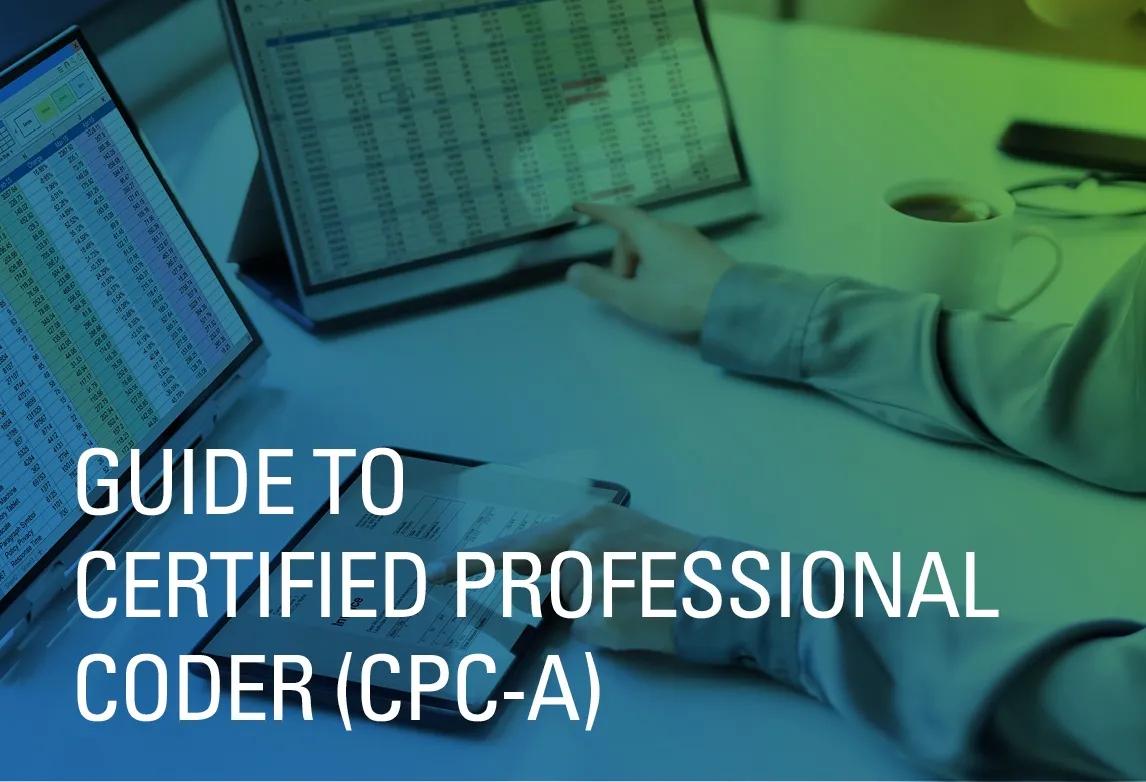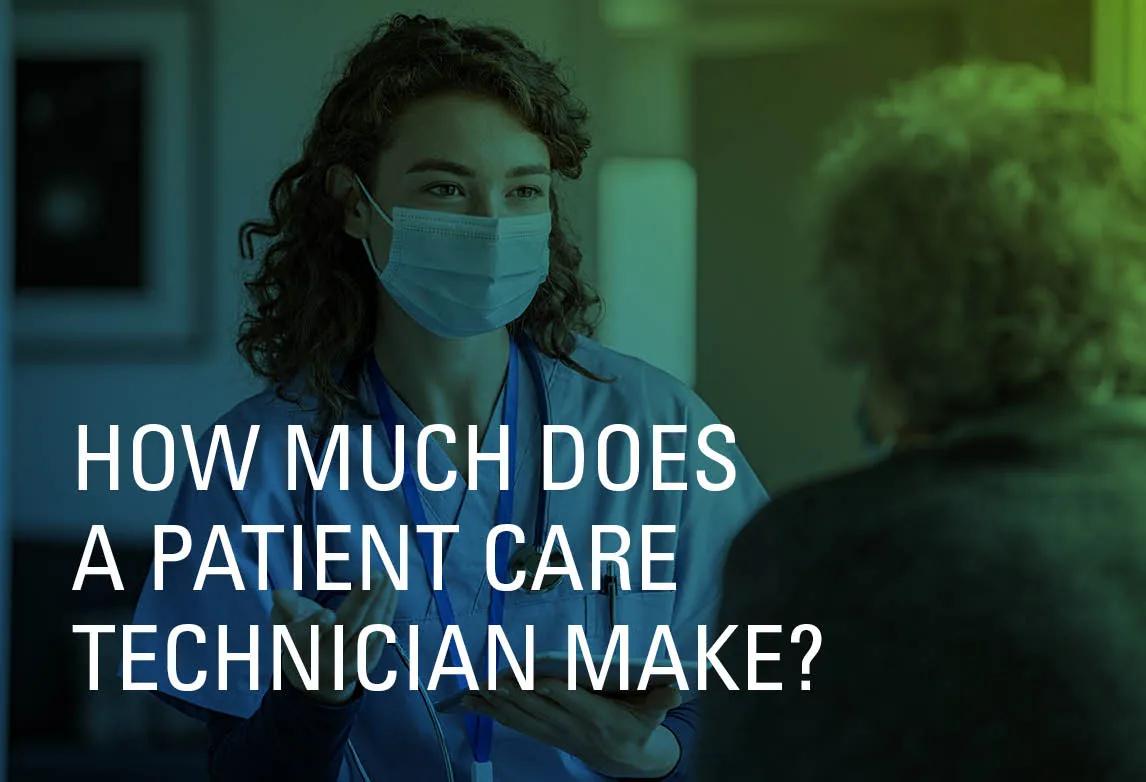Guide to Certified Professional Coder (CPC-A)

Many positions within the medical field involve providing direct patient care. However, if you’d rather have a more behind-the-scenes position, one option is medical coding. Specifically, you can become a Certified Professional Coder, or CPC.
In this guide, we explain what it means to be a CPC, the job outlook for this career path, and how much medical coders make. We also share multiple reasons to earn your medical coder certification and, should you decide that it is the right career for you, the steps you can take to become a CPC (training, schooling, finding a job, etc.).
We’ll also discuss the CPC exam, so you know what to expect when seeking your certification. But first, let’s begin with going over what a CPC is.
What Is a CPC (Certified Professional Coder)?
A medical coder is a healthcare professional tasked with translating a patient’s medical records into the appropriate codes so services and tests can be billed to the insurance provider.
For example, if a doctor prescribes a whirlpool bath to help heal a major burn, that code is 97022. By inputting this in the medical record system, the insurance company knows the treatment prescribed, which also tells it how much it must reimburse the healthcare facility based on the terms of the patient’s healthcare policy. It also tells the healthcare facility the patient’s portion of the bill.
A Certified Professional Coder (CPC) is a medical coder who has passed a certification exam administered by AAPC. Earning the title of CPC tells prospective employers that you have met a minimum level of proficiency with the codes commonly used in the medical field. This includes:
- CPT (Current Procedural Terminology) codes
- ICD (International Classification of Diseases) codes
- HCPCS (Healthcare Common Procedure Coding System) codes
It also tells future employers that you have at least two years of experience. If you complete the CPC exam prior to having this experience, a CPC-A designation is granted.
The “A” in CPC-A stands for apprentice and allows you to work as a certified coder while fulfilling the requirements needed to become a full CPC. These requirements involve either obtaining two years’ experience (which is verified via the submission of two letters of recommendation) or by obtaining one year of experience and showing proof that you completed a minimum of 80 contact hours of coding preparation courses.
Demand for Certified Medical Coders
The Bureau of Labor Statistics (BLS) reports that careers in the medical records and health information fields are expected to grow nine percent by the year 2030. This translates into a total projection of 416,400 jobs and is a growth rate that is “as fast as average” for all other occupations combined.
Certified Professional Coder Salary
The BLS reports that the median salary for a medical records and health information technician, under which medical billers and coders fall, was $45,240 per year in 2020. If you earn industry certification, however, such as the Certified Professional Coder (CPC®) credential from the AAPC then gain years of experience, you could earn more.
10 Reasons to Get Certified as a Professional Coder
Why take the additional steps as a medical coder and pursue your certification? Here are 10 reasons to earn your CPC or CPC-A:
Reason #1: Earning a certification can potentially lead to higher earnings starting out or down the road when combined with field experience.
Reason #2: CPCs may have a better chance of standing out as a candidate in a competitive job market.
Reason #3: CPCs are recognized as holding the “Gold Standard” for medical billing and coding, with the AAPC reporting that it has more than 200,000 members worldwide.
Reason #4: Some employers advertise that CPC certification is required and that applicants will not be considered if they are not certified. Thus, earning your certification opens you to more job possibilities.
Reason #5: Becoming a Certified Professional Coder provides access to multiple networking opportunities via meetings and events at local AAPC chapters as well as the AAPC Annual Conference.
Reason #6: Because continuing education credits are required to maintain your CPC, your skillset is kept up to date. This can potentially lead to a higher salary potential and more opportunities for growth in the healthcare profession.
Reason #7: Membership with the AAPC means that you have access to additional career resources such as ICD-10 training. The more prepared you are, the better you are able to maintain your credentials and stay proficient in your career field.
Reason #8: A resume indicating CPC certification can lead to more job interviews, especially when applying online with a healthcare facility that uses hiring software instructed to look for this designation.
Reason #9: Both UMA’s Medical Billing and Coding diploma program and Medical Billing and Coding associate degree programs prepare students to take the Certified Professional Coder (CPC) exam offered through the AAPC.1 This industry-recognized certification demonstrates coding skill and accuracy to potential employers.
Reason #10: CPCs can participate in online workshops, webinars, on-demand events, and downloadable podcasts without the cost and inconvenience of time and travel to stay current in the medical billing and coding profession.
How to Become a Certified Professional Coder (CPC)
The BLS explains that, to become a medical coder, a diploma or associate degree is typically required. This involves taking a course that teaches medical terminology, healthcare reimbursement methods, computer systems, and more.
Becoming a Certified Professional Coder requires that, after completing your medical coding education, you take and pass a certification exam administered by the AAPC.
Certified Professional Coder Requirements
Earning your CPC requires that you have at least two years of medical coding experience. If you pass the exam prior to obtaining two years of experience, you will be granted an apprentice designation, or CPC-A, until the minimum requirements are met. These requirements include reaching the two-year minimum or gaining one year of experience and at least 80 contact hours of coding preparation courses.
Certified Professional Coder Training
Several types of training can better prepare you for a career as a Certified Professional Coder. One is obtaining your diploma or degree in medical billing and coding. This provides the educational foundation and skillsets needed to work as a medical coder. The AAPC offers additional courses designed to enhance your coding knowledge before taking the CPC exam. This includes preparation courses, supplementary courses, and practice exams.
Certified Professional Coder Schools
You can obtain your education in medical billing and coding from a variety of schools. For instance, Ultimate Medical Academy offers both diploma and associate degree programs via online instruction. This provides students the ability to obtain their education at a time that is most convenient for them.
UMA’s 39-credit hour diploma program takes approximately 11 months to complete and the 63-credit hour associate degree program can be completed in approximately 18 months.
Certified Professional Coder Classes
Preparing to become a Certified Professional Coder involves taking a variety of classes covering topic areas such as anatomy and physiology, healthcare communication, and medical terminology. The Medical Billing and Coding diploma and degree programs at Ultimate Medical Academy include classes in:
- Diagnostic coding
- Procedural coding
- Medical law and ethics
- Claims processing
Certified Professional Coder Jobs
The BLS indicates that a majority of medical records and health information technicians work in hospital settings (33 percent). The second-most popular workplace setting is outpatient care centers (16 percent). This offers job opportunities in a variety of regions, from urban to rural, all across the U.S.
Medical Coding Experience Requirement
The AAPC requires two years of experience before you can earn the designation of CPC. However, you can take the exam before gaining this experience. If you pass, you are granted an apprentice designation, or CPC-A. To remove the “A” and become a full CPC requires submitting two letters of recommendation verifying that the two years have been completed or submitting one letter from your employer verifying one year of experience plus proof of completing 80 contact hours of a coding preparation course.
What is the CPC Certification Exam?
The CPC exam tests your knowledge in multiple areas related to medical coding. Questions cover topics such as anesthesia, radiology, labs, pathology, medicine, and medical terminology. There are also questions pertaining to coding guidelines, diagnosis, and compliance.
UMA’s online medical billing and coding programs help prepare you to sit for the Certified Professional Coder (CPC) exam.
Preparing for the CPC Exam
The AAPC has created a set of recommended steps when preparing to take the CPC exam. They are as follows:
- Take medical billing courses covering topics such as medical terminology and anatomy. You can find these types of courses at schools such as UMA.
- Complete the AAPC’s CPC Preparation Course, which is offered both online and in the classroom
- Complete the CPC Study Guide, full of practical examples, sample questions, and test-taking tips
- Take a 50-question online practice exam, of which there are three
Once you complete these steps, you are ready to take the CPC exam assuming you meet the eligibility requirements.
Benefits of AAPC Certification
AAPC membership offers several benefits. With over 200,000 members, you have access to a large pool of healthcare professionals with which you can network. You also get free webinars (4 per year), AAPC product savings, and access to job-finding resources.
Is CPC Certification Worth It?
Only you can decide whether it is worth it to obtain your CPC certification. That said, if your goal is to show prospective employers that you have the skills and knowledge necessary to provide medical coding services, a CPC certification can help achieve this goal.
Start Your Medical Coding Career Path Today
If you are ready to pursue a career path in medical coding, Ultimate Medical Academy offers both diploma and associate degree programs. The diploma program can be completed in as little as 11 months and the associate program takes approximately 18 months to complete.2 Both are available online. Contact us today to learn more!
FAQs
How much does a certified coder make?
The role of a medical billing and coding specialist falls under the Bureau of Labor Statistics’ (BLS) medical records and health information technician job functions. According to the BLS, individuals performing this type of work earn an median salary of $45,240 per year. However, actual pay varies based on your level of education, experience, certifications, geographical location, and a variety of other factors.
How do you become a certified professional coder?
The BLS explains that, to become a medical coder, a diploma or associate degree is typically required. Becoming a Certified Professional Coder requires that, after pursuing your medical coding education, you take and pass a certification exam administered by the AAPC providing you have met the eligibility requirements.1
What does a professional coder do?
A professional medical coder translates a patient’s medical records into the appropriate codes so services and tests can be billed to the insurance provider.
Which coding certification is best?
You can obtain various medical coding certifications through the AAPC. The best coding certification depends, in part, on the type of facility you’d like to work within. For instance, the AAPC reports that a CPC certification is good for physician-based coding whereas Certified Outpatient Coder (COC) certification is helpful when working for an ambulatory surgery center or billing for outpatient hospital services. Certified Inpatient Coder (CIC) certification is beneficial for those working in billing for inpatient hospital services.
1 Learners must meet eligibility criteria to sit for applicable certification exams.
2 Completion times may vary depending on the individual student.
Request Information
Talk with us. Start your journey.
Complete this form and we'll call you to explore options at UMA and answer your questions. We'll also email you info on how to get started. We're with you at every step!
Request Information
Talk with us. Start your journey.
Complete this form and we'll call you to explore options at UMA and answer your questions. We'll also email you info on how to get started. We're with you at every step!
About the Author
 Adam Fenster
Adam FensterAdam Fenster is a senior copywriter at Ultimate Medical Academy, with journalism experience from his time as a reporter and editor for multiple online and print publications. Adam has been covering healthcare education since 2019, with an emphasis on topics such as wellness, healthcare employment, and job preparedness. He received his BA in journalism from the University of South Florida.
Related Content

How Dental Assistant Training Can Prepare you for a Career in Dentistry
Read More
Do You Need a Pharmacy Technician License to Work in This Healthcare Role?
Read More